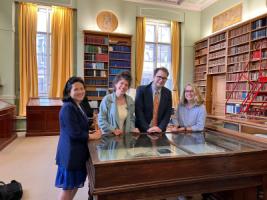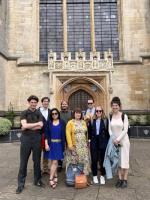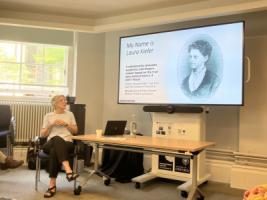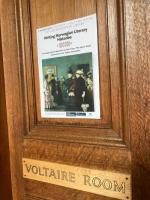
Scandinavian Studies at Oxford connect scholars across faculties and career levels. Interdisciplinary in nature, however, the field currently has no institutional home at the university. Inspired by the Oxford-based Nordic Network, active from 2015 to 2018, the new postgraduate Oxford Scandinavian Studies Network seeks to create a new hub for Scandinavian Studies at Oxford. Funded by The Oxford Research Centre in the Humanities (TORCH), the doctoral network is led by Sarah Fengler (Jesus College), Leif Hammer (Magdalen College), Marie Martine (Hertford College), and Tzen Sam (Jesus College). Our first round of activities spanned the entire academic year: after having launched a Call for Papers in Michaelmas 2023, we invited four doctoral students of the Humanities from the UK, Norway, and Germany to join us for four online seminars in Hilary 2024, a follow-up workshop at Oxford in Trinity 2024, and an exhibition of the newly acquired Marie Wells Collection in the Taylor Institution Library.

The Network’s aim is to support our speakers alongside their research in Scandinavian Studies. Therefore, we decided on an innovative format based on a work-in-progress approach that would follow the selected participants through their writing processes. In our fortnightly seminars in Hilary, all speakers gave a brief presentation on their current work, whether article, thesis chapter, or side project, followed by a first discussion round. Based on this initial feedback, all speakers turned their presentations into longer written pieces for our in-person workshop on 17 May in the Radcliffe Humanities Building and the Taylor Institution Library. While everybody was supposed to read all eight papers in advance for our plenary discussions during the workshop, each speaker had to prepare a more extensive response to one of the other papers. By choosing the Norwegian grunnlovsdag (Constitution day) for the workshop, we sought to mark the occasion and give the establishment of a new research forum for Scandinavian Studies in Oxford a celebratory setting.
One focus of our seminars and workshop was on transnational Scandinavian history and historiography. In the first of four workshop sessions, entitled ‘Identity and Historiography’, Peter Sebastian Hatlebakk (University of Bergen) pointed out striking parallels between Christian Magnus Falsen’s History of Norway (1923–1924) and Niccolò Machiavelli’s sixteenth-century treatise The Prince. Lesley McKay (University of the Highlands and Islands), the second speaker, explored the retention of Norse identity within the Northern Shetland Island of Unst in 1530. In the third session on ‘Mapping Intellectual Landscapes’, Leif Hammer compared the spatial conditions of scholarly practice in eighteenth-century Oxford and Copenhagen, while Ragnar Øvergaard Aas (University of Oslo) explored the making and unmaking of the Norwegian solidarity movement with Chile between 1973 and 1990.

Transitioning from history to literature, Kirsten Shepherd-Barr, Professor of English and Theatre Studies at St Catherine’s College, Oxford, enriched our workshop with a keynote on the Environments and Climates of Scandinavian Literature. In addition to offering illuminating insights into canonical works by authors such as Henrik Pontoppidan, Selma Lagerlöf, and Henrik Ibsen, she shared valuable experiences with outreach and practice-based research by the example of a collaboration with Breach Theatre on a play on the life of Laura Kieler, the model for the protagonist of Ibsen’s 1879 play A Doll’s House. In the second session on ‘Female Voices and Perspectives’, chaired by Sarah Fengler, Tzen Sam traced the recovering of the female voice in Eleanor Marx’s Ibsen translations, and Marie Martine compared representations of female bodies, hysteria, and motherhood in the authorships of Ibsen and the naturalist writer Amalie Skram. In the final session, ‘Interrogating Literary Legacies’, Sarah Fengler analysed the Christian dimension of Johannes Ewald’s biblical tragedy Adam og Ewa (1769), and Max Richter (University of Munich) explored the history of anonymous competition in the context of the work of the Swedish Academy before the Nobel Prize.
To highlight the continuing presence of Scandinavian culture in Oxford both as a city and university, we organised a themed walking tour through ‘Scandinavian’ Oxford. The first stop led us to St Catherine’s College, which was designed by Danish architect Arne Jacobsen and is in many ways representative of his style. The second stop brought us to Magdalen, where our co-organiser Leif Hammer drew our attention to certain features of the college that he discussed in his paper on ‘Scholars in Space’, inviting comparison with the University of Copenhagen. We finished with a visit of ‘Writing Norwegian Literary Histories: From Bjørnstjerne Bjørnson to Jon Fosse. The Marie Wells Collection at the Taylor Institution’ (Voltaire Room, Taylor Institution Library, 11–21 May), an exhibition we curated for the workshop. As our co-organiser Marie Martine pointed out in her introductory remarks on the exhibition, it showcases the highlights of Marie Wells’ generous donation and emphasises the plurality and variety of Norwegian literary history and its making.

All our participants and our keynote speaker Kirsten Shepherd-Barr presented brilliant presentations, outstanding papers, and inspiring discussions, all of which contributed to the success of the first round of the Oxford Scandinavian Studies Network as did the Taylor Institution Library’s collaboration and TORCH’s Student Network Scheme. We hope to continue the activities of the Network in the coming academic year and firmly establish our interdisciplinary research hub for Scandinavian Studies in the research landscape of Oxford Humanities.